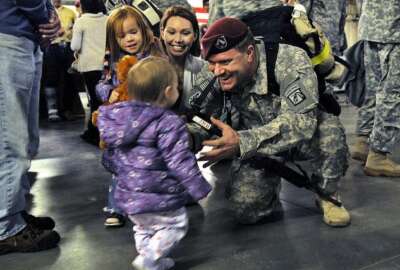 Exclusive
Exclusive Exclusive
First look: 2017 military lifestyle survey finds families feel isolated
Military families are feeling isolated in their communities and that feeling is increasing, according to the Blue Star Families' annual military lifestyle survey.
Subscribe to Federal Drive’s daily audio interviews on iTunes or PodcastOne.
Military families are feeling isolated in their communities and that feeling is increasing.
That finding is one of the new revelations to come out of the Blue Star Families’ annual military lifestyle survey. The results will be released Nov. 15, but Federal News Radio has an exclusive sneak peek into some aspects of the study.
“There are military-connected people in every ZIP code in America, whether they are active duty, guard or reserve and we are finding that people are experiencing isolation where they live. That’s something that everyone can do something about. You don’t need a law or a [Defense Department] regulation to correct that,” Blue Star Families CEO Kathy Roth-Douquet told Federal News Radio in a Nov. 1 interview.
The 2017 survey set out to investigate three main topics along with the usual survey questions Blue Star Families asks service members and their closest of kin.
Military family isolation was one of those themes the organization wanted to explore. It also looked into the experience of female service members and the increasing cost of service to military families.
“We are also seeing some really interesting divergent trends in the experience of female service members versus male service members. We have a military right now that requires a high skill set and a lot of good behavior and less than a quarter of our population is eligible to serve,” Roth-Douquet said. “We need women in the military bottom line. Right now we have 15 percent, we are expecting that to go to 25 percent. If female service members continue having greater challenges, as we are able to see in this year’s survey, that’s going to have a real impact on the health of our military.”
Roth-Douquet said one statistic that stood out is when Blue Star Families asked service members if they were able to find jobs that met their needs. Two-thirds of men were able to find jobs as opposed to two-thirds of women who said they were not able to find those jobs.
Roth-Douquet said 2017 also has a new number one issue. For the first time since the survey started in 2009, pay and benefits are not the top priority. Roth-Douquet would not divulge the newest top issue, opting to wait until the survey is released on Nov. 15.
Last year’s survey put focus on military spouses. The study found the unemployment of military spouses far surpassed the national average.
Roth-Douquet said the military spouse unemployment rate went up 30 percent in 2017.
“We think the reason for that is so many spouses had just given up looking for work. Unemployment means actively looking for work in the last four weeks. We think that the amount of attention Blue Star Families and our partners have been able to give to this topic has emboldened more military spouses to think that perhaps they could work and probably led them to seek it,” Roth-Douquet said.
Blue Star Families is working with Congress to better the opportunities for military spouses.
Sen. Tim Kaine (D-Va.) met with the group last week on the issue.
“This is not an issue that should be partisan at all. Having been on the Armed Services Committee for five years now, I know the issues where there tends to be partisan difference and I also know the issues where there’s not,” Kaine said
One big issue Kaine said he’d like to address is license reciprocity. When spouses work in credentialed fields like therapy, teaching or real estate, they often must obtain new licenses in the state they live in. Kaine and another member of Congress want to make it easier for military spouses to move to a new state without having to get a new license with different standards.
The Personnel Subcommittee has already heard some testimony on the reciprocity issue.
Air Force Chief Master Sgt. James Cody called for a national baseline on professional licenses for military spouses in order to ease the burden on them during a hearing in February.
“There [needs to be] at least some type of baseline foundation where everybody fundamentally agrees that in this transition time we’re going to accept things as long as they need some minimum level,” Cody said.
The 2016 Blue Stars Family Lifestyle Survey stated 63 percent of military spouses encountered licensing challenges due to geographic relocation.
Congress is trying to ease the fiscal burden of relicensing for spouses who move in the 2018 defense authorization bill.
The bill would provide up to $500 to families for spouses to get licensed in their occupation after a station change.
“If a spouse works in South Carolina and moves to Virginia and incurs up to $500 in relicensing or certification costs, the committee would authorize up to $500 to be reimbursed for that,” said a House Armed Services Committee aide.
But military spouses face far more challenges in finding and keeping employment than just licensing.
“We haven’t specifically worked on military spouse employment issues before. I heard that from the employers, I thought about it in terms of my own focus on issues in the committees,” Kaine said. “Getting an interview and having an employer look at you and say, ‘Wow, you’re really qualified, but boy you’re probably going to have to move in a year and a half maybe I should hire someone who is going to be here longer.”
Copyright © 2025 Federal News Network. All rights reserved. This website is not intended for users located within the European Economic Area.
Scott Maucione is a defense reporter for Federal News Network and reports on human capital, workforce and the Defense Department at-large.
Follow @smaucioneWFED





